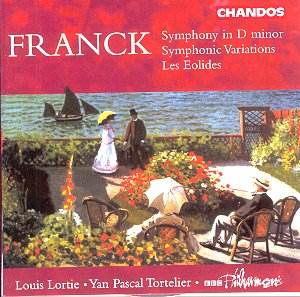César FRANCK
Symphony in D minor
Symphonic Variations
Les Eolides
 Louis Lortie, piano
Louis Lortie, piano
BBC Philharmonic conducted by Yan Pascal Tortelier
 Chandos CHAN 9875
[61:47]
Chandos CHAN 9875
[61:47]
Crotchet
Amazon
UK Amazon US

Les Eolides (The Breezes) serves as an overture to this programme.
Completed in 1876, the work is a tone poem, here lasting just under 10 minutes,
inspired by a holiday memory of the mistral, and "evoking the mythological
daughters of Aeolus, the god of the winds, who reawaken nature with their
song." It's bright and breezy, skittish and playful, building to colourful
seascapes rather than dry winds, setting the scene as Franck a French composer
in the German tradition.
Symphonic Variations notably does not describe itself as a piano concerto,
though a single movement piano concerto is what it is. The piece was premiered
on 1 May 1886, almost exactly a decade after Les Eolides, the piano
part written for Louis Diémer, who a year earlier premiered Franck's
Les Djinns. The score avoids what were becoming the pyrotechnic
clichés of the time in favour of a more introspectively considered
poetry. Effectively, the piece is a series of piano variations with orchestral
accompaniment, Franck anticipating the sombre romance of Rachmaninov with
writing which is restrained, considered and filled with enquiring tenderness.
Rather than confront each other, the BBC Philharmonic and the piano of Louis
Lortie prove a perfectly seamless blend, each extending the expressiveness
of the score without ever dominating the beautifully sculpted musical landscape.
Certainly ahead of its time, the piece deserves to be better known, and has
happily found most sympathetic advocates in this recording.
The main event is the three movement Symphony in D minor, first performed,
to less successful result than the earlier works, in 1889. The cyclic nature
of the symphony, constructed from cells or motifs which are repeated and
developed in a way which is deeply familiar to early 21st century
listeners - even those unacquainted with the concert hall know the technique
from the film music of Bernard Herrmann - initially proved a stumbling block
to critical acceptance. What once 'suffered' from too much development, a
lack of a fourth movement, tortuous chromatic harmony, a lack of orchestral
colour and the 'disconcerting' use of a cor anglais in the second
movement now emerges, to build an analogy on Les Eolides, as a hot
wind blasting the stale French orchestral world as it existed prior to the
rise to prominence of Debussy and Ravel. Of course they would take a very
different route to revitalising French music, but l'après-midi
d'un faune still lay in the early years of the next decade, and Franck
had firmly nailed his colours to the Wagnarian flag rather than reinvented
his own nation's music on its own terms. Listened to now simply as music,
it is hard to imagine what all the fuss was about, or why the work originally
had such a disastrous reception at the Paris Conservatoire.
From the opening mysterious tone colours to the bold finale, the symphony
gleams lustrously as pivotal work in late 19th century French
music. Perhaps the understated nature of the music played against it; Franck
expects the audience to pay attention and offers few moments of instantly
gratifying spectacle. Whatever the surface problems, after the conductor's
outstanding cycles of Debussy and Ravel orchestral music on Chandos, it is
doubtful the composer could be in safer hands than those of Yan Pascal Tortelier
and the BBC Philharmonic. As expected from Chandos, the production and
presentation are first-rate and the 24-bit recording has a detail and clarity
which enables one to wallow in the sumptuousness of sound while appreciating
every nuance Tortelier summons from the scores.
Gary S. Dalkin

